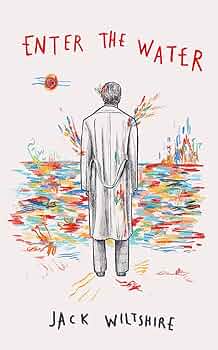Early on in Enter the Water by Jack Wiltshire, we’re casually told that there’s no hero story to be found here, but by the end of this exhilarating verse novel, you may well disagree. It tells the story of a vulnerable Cambridge student, evicted from his flat and sleeping on a park bench. Setting out on an odyssey to the coast, accompanied by pigeons, a blackbird and the forces of Nature itself, his story is a clarion call for appreciating the natural world and cultivating stoicism in our infinitely troubled times.
Behind its elegant, scholarly façade and romantic images of punting on the river Cam, Cambridge can be a difficult city, specifically, our narrator tells us, for people like him, gifted working class students lacking the funds and inculcated confidence to cope with the demands of its rarified environs.
Wiltshire, himself a graduate of the university, paints an initial picture of a young man in trauma. Standing at the window of his flat, he’s contemplating the pigeons outside and the turn of the season. Autumn leaves create a drift outside his door, but on the doormat ‘there’s not a single leaf but there are pages containing an eviction notice.’
With nowhere to go, a park bench becomes his bed, leaves become his blanket, and the local birds his companions. They’re aided by the presence of Nature itself, a voice that has already informed him that he’s not very good at looking after himself.
He’s officially a ‘homeless chap,’ and that’s not attractive to tourists. Cambridge City Council are not keen on conspicuous rough sleepers and the bench is a deliberately inhospitable structure. They’re similarly hostile to the humble pestiferous pigeon, and contemplating his fellow undesirables, our narrator decides to take flight with them on the coat-tails of a storm.
Open-hearted, experimental and drily perceptive, Enter the Water is a vivid portrayal of one man’s struggle against the odds. Who is it, he asks, that ‘denies the home you make…who decides who can curb your space/ your airways/ your voice?’. These are questions to consider as he heads towards the coast with his feathered friends, philosophising, analysing and stargazing all the way.
There are allusions to past traumas, estrangement from his mother, sexual abuse; it’s clear that certain institutions have badly let him down and he is disillusioned with the world of politics. Swept along in the arms of Nature, our dispossessed narrator considers the wider issues of exile, linking the word ‘refugee’ with ‘refuge,’ and conversely ‘refuse’, the ‘ee’ sound ‘that frightened squeak of a parliamentary mouse.’
To endure the shrunken spirit of this time of war, recession, environmental degradation and hostility to otherness, is a painful task. Out in the elements, the man shares the secret of his salvation; the act of swimming, where each entry of the water must necessarily be an act of self-reliance.
‘water does not hold on/ it is too free for that/ the force of my body is not remembered by the pool/ but is made space for.’
As the storm escorts him towards the slate grey sea at journey’s end, we wait for his conclusions, in Wiltshire’s brilliantly idiosyncratic call to courage.
Enter the Water by Jack Wiltshire is published by Corsair, 208 pages.
If you enjoyed Enter the Water you might also like Wintering by Katherine May.





